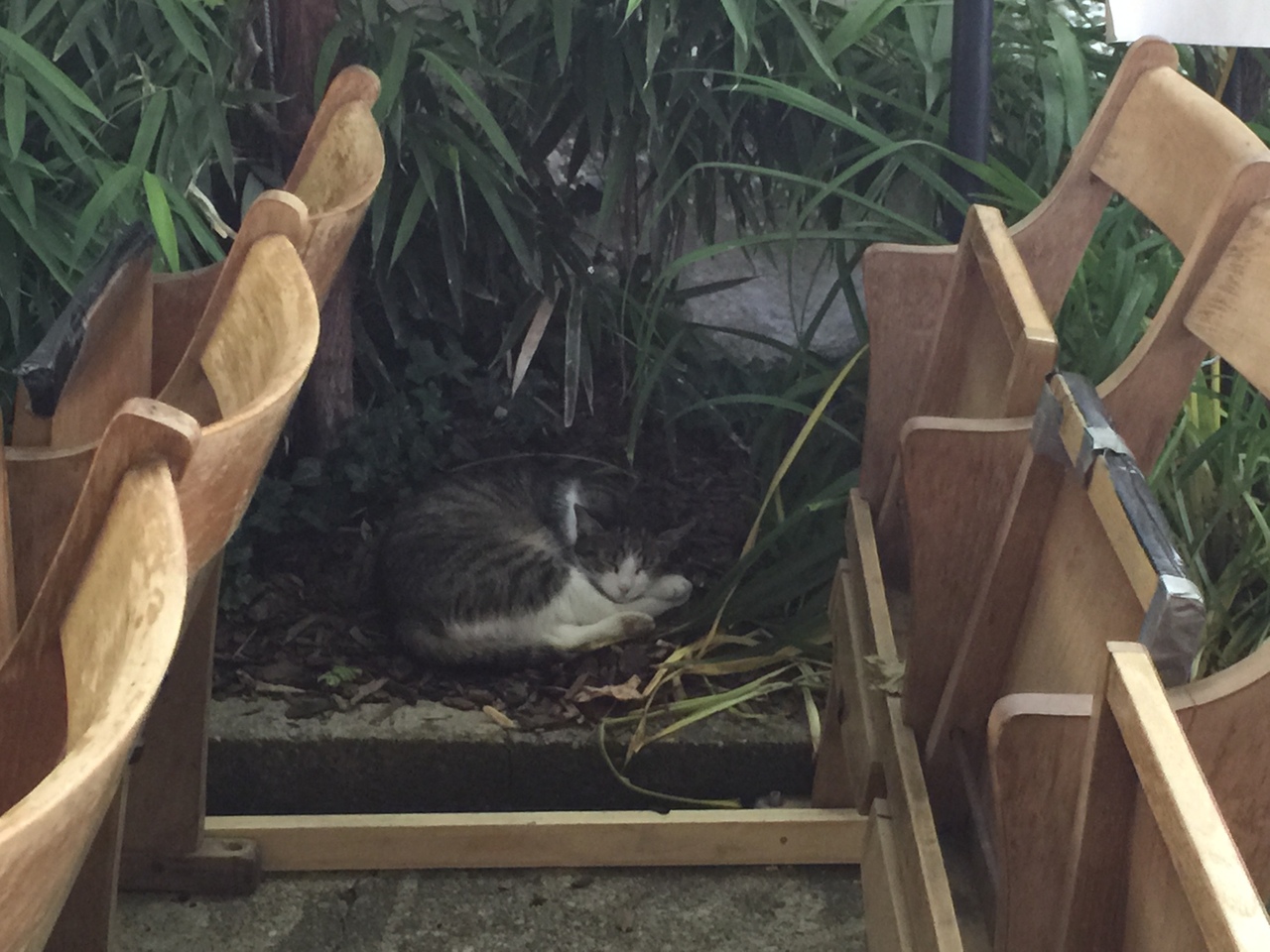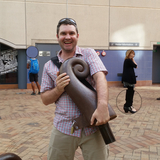Day Two: Punctilious Harbinger
Ahh, the Kleylehof. Six kilometers away, but a fully realized other world. In the dark and cold warehouse - so hot and bright outside, dark and cold was a total pleasure - doublebassist Mike Majkowski's solo began with him focussed on the edge of a string. Slowly building a world from the ground up, he punctuated the slight rufflings with the sudden drop of a long plumb-bob of bass into space. Low-frequency radar test. Running his finger all the way from the top of a string to the very bottom, tiny shakes of the wrist between each bob like a little fish wriggling before being hooked for bait. Bob and wriggle, bob and wriggle, suddenly I realised it was all a slow gearing-up for that wriggle-with-a-little-tempest-tossed-in.
It was like he was making one big wave, a wave just on the edge of breaking, forever, till a current comes in from underneath and unwrinkles the crest; it never breaks, just artfully subsides.
San Franciscan Bob Ostertag's solo was a video-game-controlled dark obtuse pinging - a tall bald man barefoot with a joystick. It felt limited, passive to the pre-existing structure: like a video game, he could only interact with what was already there, when what we all need is what's outside it. Tonally it was too thin, made of digital zoinks, a la the sound of cereal. If I didn't see him triggering every sound with a controller it would have still sounded video-gamey.
Dror Feiler's solo on reeds and electronics, in contrast, showed how the revolution isn't about technology, it's about humanity. Ten days before his performance he was in a prison in Israel, and not for the first time, since he continues to insist on the necessity of bringing food, medical supplies, and music to Gaza. To contextualize the political motivations of his music practice, he quoted d'Alembert: "If you want to keep the monarchy, don't change the form of opera." He muted a soprano saxophone and moved it like a snake charmer, entrancing through the rhythm of movement. A heavy wall of electronics buzzed underneath, but not too loudly - an actual background upon which to bend multiphonic snarls. Then he doubled up and added a sopranino, splicing his breath in two directions. "Music is castrated noise," he said later.
Philipp told me that Dror's set was intimidating, that he felt like he was in a plane that was crashing, but I felt encouraged by it, humbled too. And challenged. Challenged in the most inviting way, challenged to think and feel my actual thoughts and feelings, and to act on those. I was reminded that the integrity of the moment resides in the body; a witness and an agent.
The set was all about the relationship of the background to the foreground - the throbbing electronics and the human breath singing. I could feel the noise in my throat, making an elevator of vibration up and down my spine, electrodynamic shock on shock, how do equal halves not behave equally? Dror’s unaccompanied alto saxophone solo afterwards put the soul in context. Giant slicing electronic thrums came back with a tenor saxophone dirge. He ended this extraordinary set shaking a handful of bells while the electronics raged and he pointed the bell of that sopranino straight at the audience and belted a cluster of falling attacks.
The band Ashes kicked the evening off back at the Jazzgalerie, and gave that slow sundown a run for it's money. Richard Scott's squirty modular snythesizer danced over Steve Heather's always-on-point percussion. Julia Reidy's electric guitar swirled and swirled and snapped into place at every crucial moment while trombonist Hilary Jeffery gave signals to the band, leading them into a free jazz krautrock spiral, like early Kraftwerk learning how to garden with kitchen implements. One audience member yelled "YEEEAAAAHHHH" many times, and Jeffery echoed him with aggressive "grrrrrr"s through the trombone. The whole set was building, building, building, and just when it was going to climax, it chugged to a stop, a fantastic riveting breakdown.
The trio Watussi (Ingrid Schmoliner on prepared piano and voice, Joachim Badenhorst on reeds, Pascal Niggenkemper on doublebass) followed this rocking buildup with a subtle set that vented a lot of what was in the air. Just like the church bells that rang moments before the set began, the piano rang with single prepared tones to start this set. Niggenkemper stuck a clip-light to his bass. It looked like an extra ear - an ear that shouts, because he used it to produce raspy metallic waves. The band graduated into heavy dark thunderclouds, and I considered how saxophones float. Badenhorst started on tenor, where he sounded like he had a piece of bread stuck to the top of his mouth, and he was trying to use the vibrations of the reed to loosen it, and by that I mean I loved the focussed anxiety of his tone. He switched to bass-clarinet, sometimes with no mouthpiece, and secured a line of generous introspective grandeur that he was willing to share with everyone, and within which all were blessed.
Because of where I was sitting, I could see pieces of whatever Schmoliner had used to prepare the piano fall down and rest on the strings, then get hit by a string and pop back up. She also had a pile of chopsticks laid across the top register of keys and at one point inserted one perpendicularly into the strings and slowly rubbed it up, giving off the softest glow. Pushing the stick down made a sound like a reedist's tongue-pop throbbing on wood. She sang the last song, and it was soft, and it was right.
John Butcher (reeds) joined the string trio of Harald Kimmig (violin), Daniel Studer (doublebass) and Alfred Zimmerlin (cello) for a set that was all focus. An obvious comparison is Anthony Braxton's 1979 record with the Robert Schumann string quartet, but where that record rather playfully toyed with a contrast of styles, this performance dug into density.
Butcher's playing has taken the stereotype of British "insect music" and pushed it as far as it can go, to the level of the microscopic, the molecular. And this string trio is so equally virtuosically adept that speed was absolutely independent of density: fast or slow had no bearing on the stampede of musical ideas developed. The sun was finally all the way down, and the heatwave we were all living through parted. Quiet exhaustion set the table for intense concentration. While it would be easy to dismiss this kind of music as overly intellectual, the truth is that, yes, you do have to be smart to play it, but the deeper truth is how it is viscerally affecting. The music radically changes mood, mindset, habit. This set and this combination of players onstage represent the best of what happens at the Konfrontationen: thoughtfulness multiplied exponentially, existentially grounding.
After Nina de Heney's (doublebass) performance in Wels the previous year with Christine Sehnaoui, I was eagerly anticipating her set with Mariam Wallentin (voice, percussion) and Lisa Ullén (prepared piano) in a new trio called Nuiversum. A little bit unexpectedly, they were performing songs. I love the tunes Wallentin writes and performs with her husband Andreas Werliin in Wildbirds & Peacedrums, but something undercut the intensity these three were striving for. It might have been the length of the songs, which were short, around five minutes each, but maybe they needed to be REALLY short, or maybe they needed room to develop. Whatever it was, I couldn't find the groove.
Some of the lyrics mentioned shame, some of the lyrics mentioned mercy. I sat near Ullén's piano, and I got a great feel for the timbral agility of her contributions to the mix. I was struggling with the set so I changed seats to see if anything would shift, and when I did I really lost the subtlety of what she was doing without gaining any additional listening insights. I went back to my original seat so I could hear Ullén better. I loved her sound, I loved de Heney's sound, I loved Wallentin's voice, but the structure of these songs wasn't compelling, and somehow it all added up to less than the individual parts.
By now it's night, dark night, and to keep listening right you need something with volume, flair and precision. Bring on Lotto: Mike Majkowski on doublebass, Lukasz Rychlicki on electric guitar, Pawel Szpura on percussion. Knowing Majkowski in more subtle contexts, I focussed my ears on him to begin. He brought a heavy commitment to rage onstage, a sunstruck debt to lavish the night with striations of pulsing color. Then I focussed on Szpura, who attacked the drums like a woodpecker does a tree: blast blast feed, blast blast feed. Once I had the tectonics of the rhythm section in mind I could really hear the guitar - as subtle as poison seeping through your veins, enlivening your nerves just enough to send them into shock. They rocked. I rolled. Free jazz prog rock heavy metal dance music. Rhythm and melody in an interstellar tumble blur. The kind of band every teenage couple wants at their wedding but they're so crazy in love they're eloping to Vegas. Everyone in the audience should have been dancing.
Now it's really nighttime. About three in the morning. And the next set is in a few hours, at sunrise. What to do? Take a nap and get back up? After the previous eight sets already heard that day, it's unlikely my body would accept that short amount of rest and relent to rise. So we stayed up. And in the field behind the Jazzgalerie, Hamid Drake and Pasqale Mirra set up for their duo of sun percussion and vibes/percussion.
A sunrise is always special. At this time of year, in this part of the world, it's a slow rise starting from a firm glow: pink and red and orange. The vibes gave off a sense of percolation, nurturing every blade of grass in the field from the soil up. Drake singing and playing hand percussion with that soft ever-brightening glow of light ascending around us. Lying down and looking straight up into the sky or standing and looking out at the long horizon of farmland in the distance, spiderwebs of rhythm biting your mind to attention.
Words can be great friends, and bring you closer––to friends, to music, to life. At other times they're superfluous, and get in the way. Touch that grass and hear those vibrations and see those colors in the sky.




